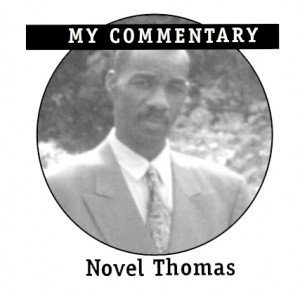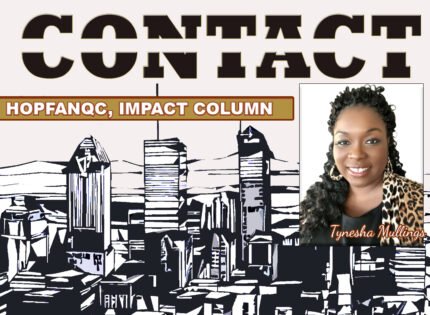So as life continues to unfold, I maintain an interest in the continent of Africa. I wasn’t born there, and that’s a moot point, but I am of there by lineage. And despite all that has happened there throughout my lifetime, I haven’t… can’t become jaded.
It’s a world I inherited a few decades ago, which has become increasingly crazy and messed up in this, the 21st century. And it’s unfolding, some say unraveling as it should, forcing people out of necessity to converge (and unite) around ideological issues of specific and common interest, such as race, culture, ethnicity, politics…
That said, it’s incumbent on us – people of African descent scurrying and scuffling at the base of the ladder of upward social mobility – to find ways whereby we can coalesce around matters of common interest, concern and importance and force our way up.
Always bear in mind that reverberating clarion call in the collective context, “If you want to go fast, go alone. If you want to go far go together.”
I know, you’re probably thinking that I’m thinking and talking about the impossible. There’s that perception, and many Black people believe it’s the reality, that as a race we’re doomed. But call me a Pollyanna (or if you like, Pollyannish) for, as the pessimists say, “hoping for the impossible.”
And I say, what’s life without hope.
After all, our history, at least that part of it where Contact and Slavery and all that one can infer from that ‘dark’ and defining period got in the way, resulted in ‘life’ as we know it today, one fraught with multiple socio-economic, -political and other challenges.
Some, the pessimists, see this legacy and life as our permanent reality; I’ve even heard quips like “[…] we’re doomed…are in a bad way.” I see it simply as a legacy generations have been trying to overcome.
In moments of reflection it seems like all is lost, like there’s no hope, what with all the powerful global institutional forces that are aligned against us. But then I stop reflecting and thinking… remembering what a man once said told me during a conversation, “[…] Think long, you think wrong…”
So I stopped thinking… focusing instead on the tangible change I’ve observed over the years and propitious signs of inevitable change to come.
Sure, in our collective situation – that specific African human race context – changes haven’t come easy, causing some to say “the more times and things change, the more they seem to remain the same.” That’s the pessimists’ view.
Nevertheless, as a great man once stated, “We shall overcome.”
In a way I’m feeling sorry for the collective, for how some continue to view our African future. Notwithstanding all it has been deliberately subjected to and endured for centuries (tribalism, colonialism and neo-colonialism, generations of bad governance and internecine (proxy) conflicts, genocide, resource pillaging…) until Africa stands up, we here will remain in our social predicament. A strong Africa means international leverage.
But the pillaging of Africa continues, except more countries (regarded as economic colonialists, like China) have become involved on the continent, aided and abetted by corrupt continental political leaders who have become beholden to powerful state-like multinational forces…
Truly a shame that today’s Africa, a continent which after centuries of pillaging, is still blessed – some Africans born on the continent contend that it is “cursed” – with bountiful natural resources, especially many strategic minerals used in the production of numerous electronic and other things… the developed and developing nations of the world crave.
But most Africans are not benefiting from the financial in-flow of their continental birthright, their countries natural resources. One only has to look on the ground, what it presently is, and what most Black people say it could and should be.
Africa’s numerous shortcomings notwithstanding, the global economic powers – developed and developing – all have economic stakes in the continent and manage to find ways to access all that they need to keep various industries thriving.
Paradoxically, as the most important source of just about everything the developed world needs to feed their children, Africa cannot feed its own [children] and must periodically appeal to others for sustenance. She’s blessed with the wherewithal to feed itself, but lacks the ability, the know-how, perhaps the desire to look after itself.
In times of crises she seems unable to take care of its own, instead it depends on thousands of NGOs that have taken up permanent residence on the continent. That reality continues to baffle me.
Just look the heartbreaking images coming out of Africa. Countries in East, West and Central Africa; conflict in the Horn of Africa; famine, drought, hunger, starvation, conflicts, political crises with political leaders rather than embracing the concept of democracy and good governance are seeking (different ways) to extend their political lives, as is currently the case in DRC, as happened last year in Rwanda, Burundi and other countries.
And the people are disgruntled, deprived…
Which begged the questions during a conversation the other day: Have you ever seen the presidents of any of those countries in crisis looking unhealthy or needy? And why aren’t leaders gathering to talk about ways to feed Africans and develop Africa rather than having cargo planes dropping food?
The answer is the continent is addicted, has become conditioned to appealing to the world for food to feed its hungry people.
In Dead Aid: Why Aid Is Not Working and How There Is a Better Way for Africa, Zambian Economist Dambisa Moyo has figured it all out and provided some answers. “Aid,” she writes, “crowds out financial and social capital and directly causes corruption.”
She contends that it’s a myth that “billions of dollars in aid sent from wealthy countries to developing African nations has helped to reduce poverty and increase growth.”
“In a perfect world what poor countries at the lowest rungs of economic development need is not a multi-party democracy, but in fact a decisive benevolent dictator to push through the reforms required to get the economy moving…Africa is addicted to aid.”
She goes on, “The notion that aid can alleviate systemic poverty, and has done so, is a myth. Millions in Africa are poorer today because of aid; misery and poverty have not ended but increased. Aid has been, and continues to be, an unmitigated political, economic, and humanitarian disaster for most parts of the developing world.
“If you think about the last 50 years, Africa’s proximity and historical context has absolutely been with Europe and the United States, but their approach in dealing with the economic challenges that Africa faces in particular has been one of handing out aid, not developing economies, not building a long-term relationship around agriculture and so on.”
Which is what Africa needs, one of the reasons why it is in a perpetual state of “want.” The developed world has no interest in helping Africa to develop. Food aid, yes, but not technology (take the fisherman) whereby the continent can begin to engage in ways to develop and feed itself.
And Moyo’s coup de grace, “The trouble with the aid-dependency model is, of course, that Africa is fundamentally kept in its perpetual childlike state…”
And since the end of colonization most of Africa’s upstanding, nationalist, Pan-Africanist leaders have been killed by externally-supported forces only to be replaced by a current coterie (of political leaders) who for the most part have done little to bring their nations into the 21st Century. The evidence is there for the world to see.
And yet, despite the recurring stories (of misery we continue to see) coming out of Africa, the continent hobbles along, refusing to fall to its knees. Credit its industrious, entrepreneurial class, especially its educated young people who chose to not risk their lives by crossing the Mediterranean. They are the new breed who want to build the continent so more Africans can stay home and pull their countries and the continent out of its morass.
In watching another Focus on Africa, a weekly news magazine of African issues broadcast on BBC every weekend, I was struck by Africans making a difference, a contrast to the vortex of negativism, pessimism and hopelessness coming out of Africa via the mainstream media, which one can so easily get sucked into.
Watch Focus on Africa and juxtapose the stories of drought, famine, hunger, starvation and conflict… and urgent UN request for multi-billion dollars of assistance to alleviate the suffering of Africans with those propitious Focus on Africa ones.
Viewers are presented another side of what else is happening on the continent: people in rural and urban Africa with an entrepreneurial spirit going about their daily lives as they eke out a living.
Finally, in watching Focus and periodically other Africa-oriented programs I’m reminded how certain people who being interviewed or simply passing by resemble people in this part of the world with whom I am familiar, or have seen somewhere before.
I’m watching and thinking that woman, man, child… looks like such and such a person I’ve seen in this city or elsewhere. And that’s the truth.
My weekly taste of Focus on Africa is a reflection of the unmistakable connection, the strong ties that bind… The chains and shackles have been shed, but not the mirror images and reflections of us on the African continent and here. Even the late Richard Pryor in one of his comedy shows made that observation. How then, can we, you, not connect with that faraway place, despite all the madness we’ve seen over the years happening there? It’s all a reflection of us in our different environments. The onus is on us to do the right thing—for all of us sake.















